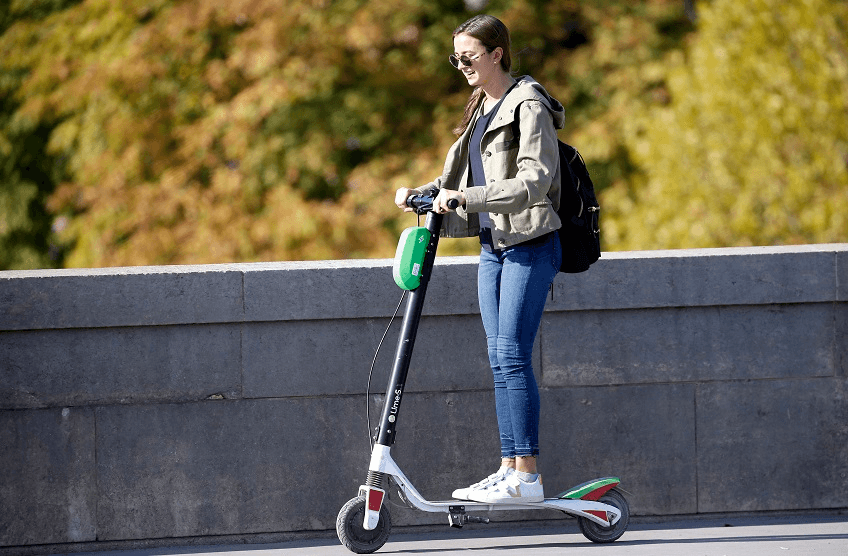Tax law makes it pretty clear: services being provided in New Zealand attract goods and services tax. So why can’t the US electric scooter ride share phenomenon clarify whether it’s collecting it?
Update 22 November: For Lime’s response to this story, see the comments at the the bottom of the page.
As Hayden Donnell wrote recently, “New Zealanders have engaged in their time-honoured tradition of collectively freaking out” over the recent introduction of Lime scooters in Auckland and Christchurch.
At the risk of adding another “maybe Lime is bad” article to the pile, the electric scooter hire company could be dodging a shitload of tax by charging users via a US company and not adding GST.
Don’t get me wrong, aside from Lime being a bit pricey I quite like the thrill of caning it along a bumpy footpath with the wind flowing through my unhelmeted hair, weaving perilously between the pedestrians and councillors making their merry way on boring old foot.
But from what I can tell, when you hire a Lime scooter using the company’s app your credit card is charged by a US operating entity, Neutron Holdings, and these charges do not include GST. I say “from what I can tell” because, despite repeated questioning, Lime won’t actually tell me.
When I asked via Lime’s online support, a staff member said that since New Zealand is a new market, they “probably do not have that at the moment” and that their “engineering team” is “working on this”.
So I called Lime’s local media people, a Brisbane PR firm, who said getting an answer “should be easy enough”. But despite weeks of emails and calls, all they’ve been able to tell me is “Lime pays all necessary taxes and permits associated with operating in New Zealand”.
In a last-ditch effort to get a straight answer, I visited Lime’s Auckland headquarters in Kingsland. No-one there knew the answer either, so I was asked to leave a number and told someone would call me back. I never got a call.
Why does it matter?
Almost everything you buy in New Zealand, from your morning coffee to your evening herbal tea, attracts 15% GST. Most consumer-facing companies include this in the price of whatever they’re selling and then pass it on to the government. It’s simple to apply, easy to understand, and within our current tax regime it’s pretty important to the running of the country. GST makes up about a quarter of the government’s tax revenue – around $20 billion a year. That’s the equivalent of what we spend on education, the defence force and the police combined.
Of course, the internet came along and made this easy-to-understand tax a whole lot murkier. With New Zealanders eagerly spending millions on overseas goods each year our laws failed to keep up, creating an uneven playing field between New Zealand retailers that collect GST and the offshore stores that don’t. From October next year the government will attempt to get some of those overseas online retailers to collect GST, but it’s going to be pretty difficult to make them.
However hiring a scooter in the middle of Queen Street, even if it’s via an app, is different to buying a nose hair trimmer from China.
It’s obvious that Lime is a service on the ground in New Zealand used by New Zealanders, not a physical product sold online by a retailer like Amazon. Still, it’s unambiguous as far as the tax man is concerned: The “existing law is clear” that GST applies to non-resident companies if the goods are in New Zealand when they’re sold or the services are physically performed by a person in New Zealand, Inland Revenue said in a statement.
A 2016 law change extended this to also include “remote services supplied to a person resident in New Zealand”, prompting the likes of Netflix and Spotify to start adding GST to their subscription prices.
It’s hard to know exactly how much money Lime is making – and by extension, how much GST the business may be failing to collect. But there are clues. Lime has publicly boasted of clocking 40,000 rides across Auckland and Christchurch in its first week of operation. Extrapolated out, that’s more than 2 million rides a year. Quartz estimates that the average ride time on a Bird scooter, one of Lime’s competitors in the US, is 12.8 minutes.
If that’s an accurate average, Lime could be failing to collect more than $1m of GST annually.
When I asked Inland Revenue whether it was aware of Lime and would be taking any action to ensure it was following the law, a spokesperson said the department couldn’t talk about individual cases.
Independent tax expert Terry Baucher wasn’t so coy, saying that what Lime appears to be doing “ticks all the boxes” for being a service that should be taxed. “This is a tricky area. It’s where the GST system creaks at the seams.”
But he doesn’t think a large global company like Lime has simply overlooked GST.
“These organisations, they push the limit on the tax laws. But they are not aggressive to the point of stupidity. I doubt that whoever established the Lime operation here did so without considering GST. They’re importing hundreds of scooters – that’s a substantial whack of GST they’re going to pay on the way in and any business would want to recover that. The search is to find the entity they’re using down here.”
Lime does have a New Zealand entity that it has used to apply for a mobile trading licence from Auckland Council – Lime Technology Ltd. If Lime is attributing its costs to its New Zealand company but none of its income, not only could it be depriving the government of hundreds of thousands of GST dollars, it could be receiving a pretty big GST refund too.
For businesses, GST is a bit like a float that they hold on behalf of the government. Each tax period, they tally up how much GST they’ve collected from customers, and subtract the amount of GST they have paid on goods and services to run their business. If they’re doing well, usually they’re left with more GST received than GST paid and they will pass on that chunk of cash to the government.
But if that number is negative and they’ve paid more GST than they’ve received, the government gives them a refund. Lime will have paid a lot of GST on importing its scooters, leasing its headquarters, maintenance and advertising that it could claim back.
If Lime is structuring its operations this way, there’s also a big question about company tax on its profits. But that’s another, much more complicated story.
Governments and councils around the world are grappling with how to accommodate services like Lime to ensure they’re a net benefit to mobility in cities. This can cost real money.
Locally, Auckland Council has already spent $10,000 on a cringe-worthy safety campaign. Many cities have sought to recoup some of these costs by charging e-scooter companies high fees to operate. Santa Monica reportedly charges companies $20,000 each, plus $130 per scooter.
For its part, Auckland Council has charged Lime a modest total of $3,326 to operate a three-month trial in the city. When that trial is over, the council will be able to decide whether it wants Lime scooters to stick around, and if so, what further conditions it wants to set.
It might want to start by getting a straight answer to a simple question: does Lime charge GST?
Update, 22 November:
After publishing, The Spinoff received comment from Lime’s Australia and New Zealand general manager, Anthony Fleo.
Fleo said Lime’s charges do in fact include GST, despite this not being shown on the receipts within the app.
“We work with one of the big four [accounting firms] locally to help make sure we’re compliant with all local regulations.”
“Maybe some of the confusion would be on the typical receipt, I guess? So it may not be listed on the receipt, but of course yes, we pay GST.”
Asked whether Lime’s receipts should show that the charges include GST, Fleo said that “may be something we need to add”.
As for why Lime initially couldn’t give The Spinoff a straight answer after repeated attempts to get comment for this story, Fleo apologised and said he’ll be raising it with the company’s PR firm, saying Lime wants to be “open, transparent and available for comment”.
The Minister of Revenue Stuart Nash did not respond to a request for comment on this story.



